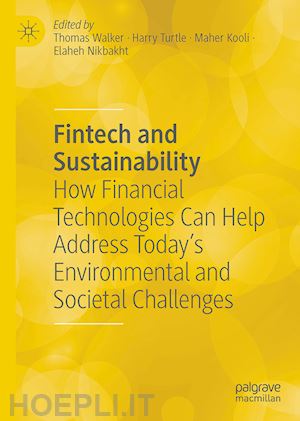
Questo prodotto usufruisce delle SPEDIZIONI GRATIS
selezionando l'opzione Corriere Veloce in fase di ordine.
Pagabile anche con Carta della cultura giovani e del merito, 18App Bonus Cultura e Carta del Docente
Fintech can improve sustainability, influence policies, and require new regulations. Climate change, water pollution, and non-renewable resources management can all be addressed with fintech innovations. Despite the advantages offered by fintech, opponents warn of potential negative consequences. The application of fintech in sustainability is a double-edged sword requiring further investigation.
This book provides an overview of fintech applications and considers their impact on the future of sustainable finance. It explores how financial technologies can enhance the sustainability of investment and corporate decisions and contribute to the fulfillment of the Sustainable Development Goals (SDGs). By considering practitioner and academic views, it examines whether and how fintech can improve sustainable practices, potential threats with possible solutions, and policies and regulations designed to improve sustainability benefits.
Part I: Introduction.- Chapter 1. Fintech and Sustainability: An Overview (Thomas Walker, Harry Turtle, Maher Kooli, and Elaheh Nikbakht).- Part II: Fintech And Environmental Sustainability.- Chapter 2. Scaling Up Climate Finance Through Blockchain-Based Digital Green Bonds (Yushi Chen).- Chapter 3. Green Energy, Emissions, and Blockchain Technology (Tony J. Erwin and Baozhong Yang).- Chapter 4. The Role of Green Finance in Supporting Maritime Sustainable Development (Massimo Arnone and Tiziana Crovella).- Part III: Fintech And Social Sustainability.- Chapter 5. Does Fintech Contribute to Fair and Equitable Outcomes? (Lakshmi Shankar Ramachandran).-Chapter 6. Fintech, Financial Inclusion, and Social Challenges: The Role of Financial Technology in Social Inequality (Simona Cosma and Giuseppe Rimo).- Chapter 7. The Metaverse’s Inspiration for Sustainable Business: Restructuring Economic Logic, Capital, Assets, Organization, and Industry (Yushi Chen).- Part IV: Fintech And Governance Sustainability.- Chapter 8. The Circular Economy: A Fintech Driven Solution for Sustainable Practices (Vincent Grégoire and Kevin Guay).- Chapter 9. The Role of Fintech in the Field of Sustainability and Financing (Niccole Jordan, Patrick Röthlisberger, Julia Meyer, and Beat Affolter).- Chapter 10 .The Mediating Role of Fintech on ESG and Bank Performance (Nur Badriyah Mokhtar and Ashraful Alam). Chapter 11. Integrating AI to Increase the Effectiveness of ESG Projects (Sean Stein Smith).
Thomas Walker is Professor of Finance and Concordia University Research Chair in Emerging Risk Management at Concordia University, Canada. Prior to academia, he worked for several years in the German consulting and industrial sector at Mercedes Benz, Utility Consultants International, Lahmeyer International, Telenet, and KPMG Peat Marwick.
Harry Turtle is the Tinberg Business for a Better World University Professor of Finance at Colorado State University (CSU). Previously, Harry held the positions of Department Chair and Omer L. Carey Chair in Finance, Washington State University; and Fred T. Tattersall Distinguished Chair of Finance at West Virginia University.
Maher Kooli is a Professor of Finance and Head at the Department of Finance of the School of Management (ESG), Université du Québec à Montréal (UQAM). He is also Caisse de Depot et Placement de Québec (CDPQ) research chair-holder in portfolio management, founder of the Trading room at ESG UQAM, and Autorite des marches financiers (AMF) and Finance Montreal research co-chair-holder in Fintech at ESG UQAM.
Elaheh Nikbakht holds an M.Sc. degree in Finance from the John Molson School of Business, Concordia University. She currently serves as a research assistant at Concordia University. In addition, she works as a Senior Data and Reporting Analyst at Maples Group.











Il sito utilizza cookie ed altri strumenti di tracciamento che raccolgono informazioni dal dispositivo dell’utente. Oltre ai cookie tecnici ed analitici aggregati, strettamente necessari per il funzionamento di questo sito web, previo consenso dell’utente possono essere installati cookie di profilazione e marketing e cookie dei social media. Cliccando su “Accetto tutti i cookie” saranno attivate tutte le categorie di cookie. Per accettare solo deterninate categorie di cookie, cliccare invece su “Impostazioni cookie”. Chiudendo il banner o continuando a navigare saranno installati solo cookie tecnici. Per maggiori dettagli, consultare la Cookie Policy.